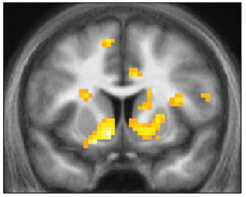Decision Making and Emotion Group
Dr. Robb Rutledge left in Spring 2020 to join the Department of Psychology at Yale University in New Haven, Connecticut, USA.
How do we make decisions? How do we feel about the outcomes?

Feelings of happiness and sadness are central to conscious experience, but we still know little about what happens in the brain when we have these feelings or how these feelings relate to the events in our lives. We have developed a computational and neural model of happiness that links rewards and expectations to subjective feelings and to dopamine. Happiness depends not on how well individuals are doing, but whether they are doing better than expected. We have also introduced a new computational model for the role of dopamine in decision making. Boosting dopamine increases a Pavlovian influence of potential rewards. By studying people of all ages using a smartphone app, we find a selective decline in this Pavlovian influence of potential rewards, which could be accounted for by the gradual age-related decline in dopamine. The Decision Making and Emotion Group combines computational modelling with neuroimaging, pharmacology, and large-scale smartphone-based data collection to study the relationship between decision making and emotion across the lifespan and in people with mood disorders including major depression and bipolar disorder.
Key References
de Berker, A. O., Rutledge, R. B., Mathys, C., Marshall, L., Cross, G. F., Dolan, R. J., & Bestmann, S. (2016). Computations of uncertainty mediate acute stress responses in humans. Nature Communications, 7:10996. doi: 10.1038/ncomms10996
Eldar, E., Rutledge, R. B., Dolan, R. J., & Niv, Y. (2016). Mood as a representation of momentum. Trends in Cognitive Sciences 20, 14–24. doi: 10.1016/j.tics. 2015.07.010
Rutledge, R. B., de Berker, A. O., Espenhahn, S., Dayan, P., & Dolan, R. J. (2016). The social contingency of momentary subjective well-being. Nature Communications, 7:11825. doi: 10.1038/ncomms11825
Rutledge, R. B., Smittenaar, P., Zeidman, P., Brown, H. R., Adams, R. A., Lindenberger, U., Dayan, P., & Dolan, R. J. (2016). Risk taking for potential rewards decreases across the lifespan. Current Biology, 26, 1634–1639. doi: 10.1016/ j.cub.2016.05.017
Rutledge, R. B., Skandali, N., Dayan, P., & Dolan, R. J. (2015). Dopaminergic modulation of decision making and subjective well-being. Journal of Neuroscience, 35, 9811–9822. doi: 10.1523/JNEUROSCI. 0702-15.2015
Rutledge, R. B., Skandali, N., Dayan, P., & Dolan, R. J. (2014). A computational and neural model of momentary subjective well-being. Proceedings of the National Academy of Sciences, 111(33), 12252. doi:10.1073/pnas.1407535111
For more references, click here.
